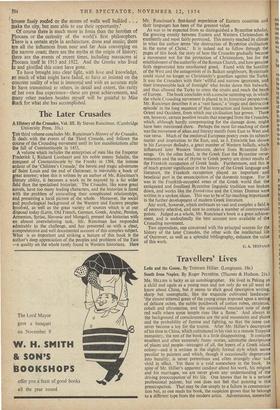The Later Crusades
TIE third volume concludes Mr. Runciman's History of the Crusades. It deals with the events of the Third Crusade, and follows the course of the Crusading movement until its last manifestations after the fall of Constantinople in 1453.
A volume which includes the enterprises of men like the Emperor Frederick I, Richard Lion heart and his noble enemy Saladin, the Conquest of Constantinople by the Franks in 1204, the intense ardour of the 'Children's Crusade,' the heroic and tragic adventures of Saint Louis and the end of Outremer, is inevitably a book of great interest; when this is written by an author of Mr. Runciman's literary ability, it becomes a work to be enjoyed by a far wider field than the specialised historian. The Crusades, like some great novels, have too many leading characters, and the historian is faced with the problem of unravelling their complicated relationships, and presenting a lucid picture of the whole. Moreover, the social and psychological background of the Western and Eastern peoples involved, as well as the great variety of sources which is at our disposal today (Latin, Old French, German, Greek, Arabic, Persian, Armenian, Syriac, Slavonic and Mongol), present the historian with an almost overwhelming task. Mr. Runciman has responded admirably to the challenge, and has presented us with a clear, comprehensive and well documented account of this complex subject. What is so important and striking a feature of this book is the author's deep appreciation of the peoples and problems of the East —a quality on the whole rarely found in Western historians. Here Mr. Runciman's first-hand experience of Eastern countries and their languages has been of the greatest value. As was to be expected from so distinguished a Byzantine scholar, the growing enmity between Eastern and Western Christendom is. excellently and most fairly portrayed. This enmity reached its climax in what the author terms 'the destruction of Byzantine civilisation in the name of Christ.' It is indeed sad to follow through the pages of this book the story of how the Crusades gradually became a movement not for the protection of Christendom, but for the establishment of the authority of the Roman Church, and how genuine faith degenerated into unashamed greed. Faced with the hostility of the West and the antagonism of its Balkan neighbours, Byzantium could stand no longer as Christianity's guardian against the Turks. It was the Crusaders With their 'willful and narrow ignorance, and their irresponsible lack of foresight' who broke down this bulwark, and thus allowed the Turks to cross the straits and reach the heart of Europe. The book concludes with a concise summing-up, in which the whole Crusading movement is placed in its,historical perspective. Mr. Runciman describes it as a 'vast fiasco,' a 'tragic and destructive episode' in the long sequence of that interaction and fusion between Orient and Occident, from which our civilisation has grown. Thera are, however, certain positive results that emerged from the Crusades, which, although hardly compensating for the damage done, might have been mentioned there. Perhaps the most far-reaching of these was the movement of ideas and literary motifs from East to West and vice versa. Much of the medimval European poetry owes its subject- matter and inspiration to the East, and, as J. Entwistle has shown In his European Balladry, a great number of Western ballads, ‘which influenced later Western literature, derive from Byzantine folk' songs, On the other hand, in the Greek East the Byzantine verse- romances and the use of rhyme in Greek poetry are direct results of the Frankish occupation of Greek lands. Furthermore, and this is of much greater significance in the history of the Greek language and literature, the Frankish occupation played an important and beneficial part in the emancipation of the domestic tongue. For it was in the Frankish-occupied areas of the Greek world that the antiquated and fossilised Byzantine linguistic tradition was broken down, and works like the Erotokritos and the Cretan Dramas were written in a spoken idiom. This was to be of far-reaching importance in the further development of modern Greek literature.
Any work, however, which embraces so vast and complex a field is of necessity selective, and sure to contain a number of controversial points. Judged as a whole, Mr. Runciman's book is a great achieve- ment, and is undoubtedly the best account now available of the Crusading movement.
Two appendices, one concerned with the principal sources for the history of the later Crusades, the other with the intellectual life of Outremer, as well as a splendid bibliography, enhance the value of this work.
C. A. TRYPANIS


































 Previous page
Previous page